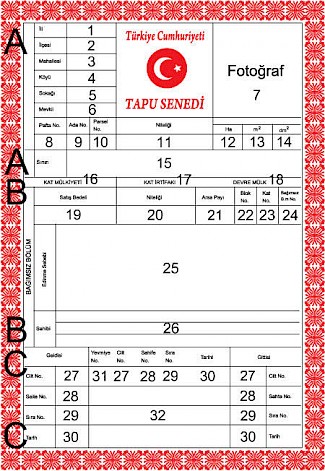Title Deed Transactions in Turkey and Key Considerations

Title Deed Transactions: Key Steps in Real Estate Buying and Selling Process
In Turkey, real estate buying and selling transactions are carried out at the land registry offices, affiliated with the General Directorate of Land Registry and Cadastre. Title deed transactions involve the legal steps necessary to officially transfer the ownership of the property. Below are the key steps involved in title deed transactions in Turkey:
Application to the Land Registry by the Buyer and Seller
Both the buyer and seller must apply to the land registry office in their residential area. During the application, identification documents, the title deed of the property, and payment for the title deed fee must be prepared.Drafting of the Sale Agreement
At the land registry office, a written sale agreement is made between the buyer and seller. This agreement includes the property price, payment terms, and other conditions.Tax and Fee Payments
During the title deed transaction, taxes and fees related to the property sale must be paid. These fees are calculated as a percentage of the sale price of the property and can be shared between the buyer and the seller.Title Deed Registration and Transfer
After completing the sale agreement and required documents, the land registry office will issue the title deed in the buyer's name. The registration of the title deed officially transfers the property ownership.Delivery of the Title Deed
After the title deed registration is completed, the buyer receives the title deed. This deed serves as the official ownership document of the property and proves the buyer’s ownership at the land registry.
Important Considerations:
Check of Title Deed Records
Before starting a real estate transaction, the accuracy of the title deed record should be checked. Any mortgage, lien, or other legal encumbrances on the property must be investigated.Identity and Authorization
Ensure the seller has the right to sell the property. If the seller is not the owner or is acting through a power of attorney, the validity and scope of the power of attorney must be carefully reviewed.Unpaid Debts
The buyer should check if there are any unpaid debts such as taxes, electricity, water, or gas bills associated with the property. These debts can be transferred to the buyer after the property is purchased.Title Deed Fees and Other Costs
The title deed fee is a percentage of the property sale price. However, to avoid any disputes, the buyer and seller should agree in advance about who will bear this cost.Condition of the Property
The buyer should inspect the property physically and obtain an expert report on the condition of the property, especially for old buildings or those requiring renovation.Post-Registration Considerations
After the title deed registration, it is important to keep the title deed safe. This document is the official proof of ownership of the property.
Title Deed
A TAPU “ title deed” is an official document which shows ownership rights over the real estate. You can only call yourself the owner of a property if you have a TAPU.
If you buy a house in Turkey, you get a TAPU 'Title Deed' . A TAPU is an excerpt from the Turkish real estate registry. This property registry, also known as TAPU office.
The TAPU contains the following information: location, a photograph of the owner, property category, facts of the property and archiving information.
There are red and blue TAPU's.
A red TAPU is for a common hold . You get a red TAPU if you buy an apartment in a complex or a house in a project.
A blue TAPU can have different legal meanings :
1. Farmland
2. Building land
A blue TAPU is not a common hold.
Most foreigners who buy a house in Turkey will receive a red TAPU.
In Turkey, you cannot sign a legal sales contract in the presence of a Turkish Civil-law notary. This is only possible in the presence of an official of the TAPU office. Prior to the official sale at the TAPU office you can sign a “promise-to-sell” contract in the presence of a notary. You should always record the actual purchase price in this “promise-to-sell” contract and register the contract at the Land Registry. This contract has a legal status. In case of problems, you can enforce the sale through the courts.
Iskan or habitation license
After the completion of the building process, the municipality will inspect the construction to make sure that it is built according to the building license and the approved construction plans. If everything is ok, the developer receives a general 'Iskan', a document which legalizes the construction. If the general 'Iskan' is issued, the house owner(s) can apply for an individual Iskan, a habitation license. This habitation license is required to connect the property to the public utilities. If you do not have an Iskan, water and electricity will be considerably more expensive. If you want to sell a house without a habitation license, you need to reduce the price drastically.
An individual Iskan is enough and not a must to obtain a Tapu. So you can own a property without a habitation license.
Finalizing the sale at the TAPU office
You just have to sign the purchase contract and pay the vendor. Buyer and vendor both receive a copy of the contract. In Turkey, the property is transferred in the presence of an official of the TAPU office. After signing the purchase contract in the TAPU office, you are the legitimate owner of the property. You don't get a copy of the purchase contract but a TAPU of the type 'Kat Mülkiyeti'. This second and final TAPU gives you the lawful ownership of the land and the finished building.
Translation and meaning of the terms on the red TAPU.
The red TAPU consists of 3 parts :
A. Main Real Estate Section. Location Details of the apartment building or project.
B. Independent Unit Section
C. Archiving data, stamp and signature of the TAPU official.
A. Main Real Estate Section. Location Details of the apartment building or project.
No.
Name
Meaning
1
Ili
Province
2
Ilçesi
Borough, district or town
3
Mahallesi
Parish, quarter
4
Köyü
Village
5
Sokagi
Street
6
Mevkii
Location
7
Fotograf
Photo
8
Pafta No
Map Number Land Registry
9
Ada No
Plot Number on Map
10
Parsel No
Parcel Number on Map
11
Niteligi
Type of Property ("Building" or "building land")
12
Ha
Hectares
13
M2
Sq.meters
14
Dm2
Sq.decim.'s
15
Siniri
Boundaries of the parcel
B. Independent Unit Section
No.
Name
Meaning
16
Kat Mülkiyeti
Ownership of real property rights for land and the finished building on the land
17
Kat Irtifaki
Ownership of real property rights for land and the unfinished building on the land
18
Devre Mülk
Timeshare. Fractional/timed ownership (the independent unit is owned just for a certain period of a year)
19
Satis bedeli
Purchase price. Make sure that this is the actual price otherwise you run the risk of a substantial fine for tax evasion.
20
Niteligi
Type of Property ("Building" or "building land")
21
Arsa Payi
Share in land shown as Share/Total
22
Blok No.
Block (Building, Mansion) Number
23
Kat No.
Floor Number
24
Bagimsiz bölüm No.
Apartment, house number
25
Edinme sebebi
The reason why the property is being acquired. For example, 'Sales', 'Donation' or 'Legacy'. Including the particulars of the buyer and seller.
26
Sahibi
Name of Owner or Owners. More than one person can own the same property. In this case, their respective shares are to be shown in this section.
C. Archiving data , stamp and signature of the TAPU official.
No.
Name
Meaning
27
Cilt No.
Binder No. First coordinate of the location of the sales contract in the Public Registry
28
Sahife No.
Page No. Second coordinate of the location of the sales contract in the Public Registry
29
Sira No.
Entry No. Third coordinate of the location of the sales contract in the Public Registry
30
Tarihi
Date of registration
31
Yevmiye No.
Transaction Number. Each transaction is assigned a unique number.
32
Siciline uygundur
Appropriate for registration. Stamp and signature of the official of the Public Registry




